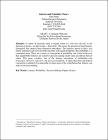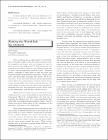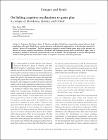Browsing Political Science (Scholarly Publications) by Author "STONE, PETER"
Now showing items 1-10 of 10
-
The Concept of Picking
STONE, PETER (2011)Human behavior, like everything else, has causes. Most of the time, those causes can be described as reasons. Human beings perform actions because they have reasons for performing them. They are capable of surveying the ... -
Conceptualizing Lotteries
STONE, PETER (2007)A number of philosophers and social scientists have investigated the use of lotteries to make various kinds of decisions. These investigations have not, however, produced a rigorous definition of a lottery. This paper ... -
Introduction to A Citizen Legislature by Ernest Callenbach and Michael Philips
STONE, PETER (Imprint Academic, 2008)In 1997, I was a graduate student in the Political Science Department at the University of Rochester. Like most graduate students, I was always on the lookout for ways to earn a little extra money. For this reason, I became ... -
Lotteries and Probability Theory
STONE, PETER (Imprint Academic, 2010)A variety of decisions seem to require resort to a coin toss, die roll, or the drawing of straws?in other words, a fair lottery. This raises the question of what features distinguish fair lotteries from alternative procedures. ... -
The Lottery as a Democratic Institution
STONE, PETER (The Policy Institute, 2013)Proponents of random selection in politics have identified at least eight potential contributions that the practice can make to the political process. These are: descriptive representation, prevention of corruption and/or ... -
Making the World Safe for Methods
STONE, PETER (2001) -
On Fair Lotteries
STONE, PETER (2008)When James Watson and Francis Crick submitted to Nature their groundbreaking paper relating DNA structure to protein synthesis, they faced a choice. In what order were their names to be listed? Would it be ?Watson and ... -
On Linking Cognitive Mechanisms to Game Play
STONE, PETER (2003)Tomonori Morikawa, James E. Hanley, and John Orbell have argued that natural selection leads populations who play Hawk-Dove, a game-theoretic stylization of confrontation, to develop the capacity for various `orders of ... -
Social Contract Theory in the Global Context
STONE, PETER (2014) -
Three Arguments for Lotteries
STONE, PETER (2010)Philosophers and social scientists have offered a variety of arguments for making certain types of decisions by lot. This paper examines three such arguments. These arguments identify indeterminacy, fairness and incentive ...












